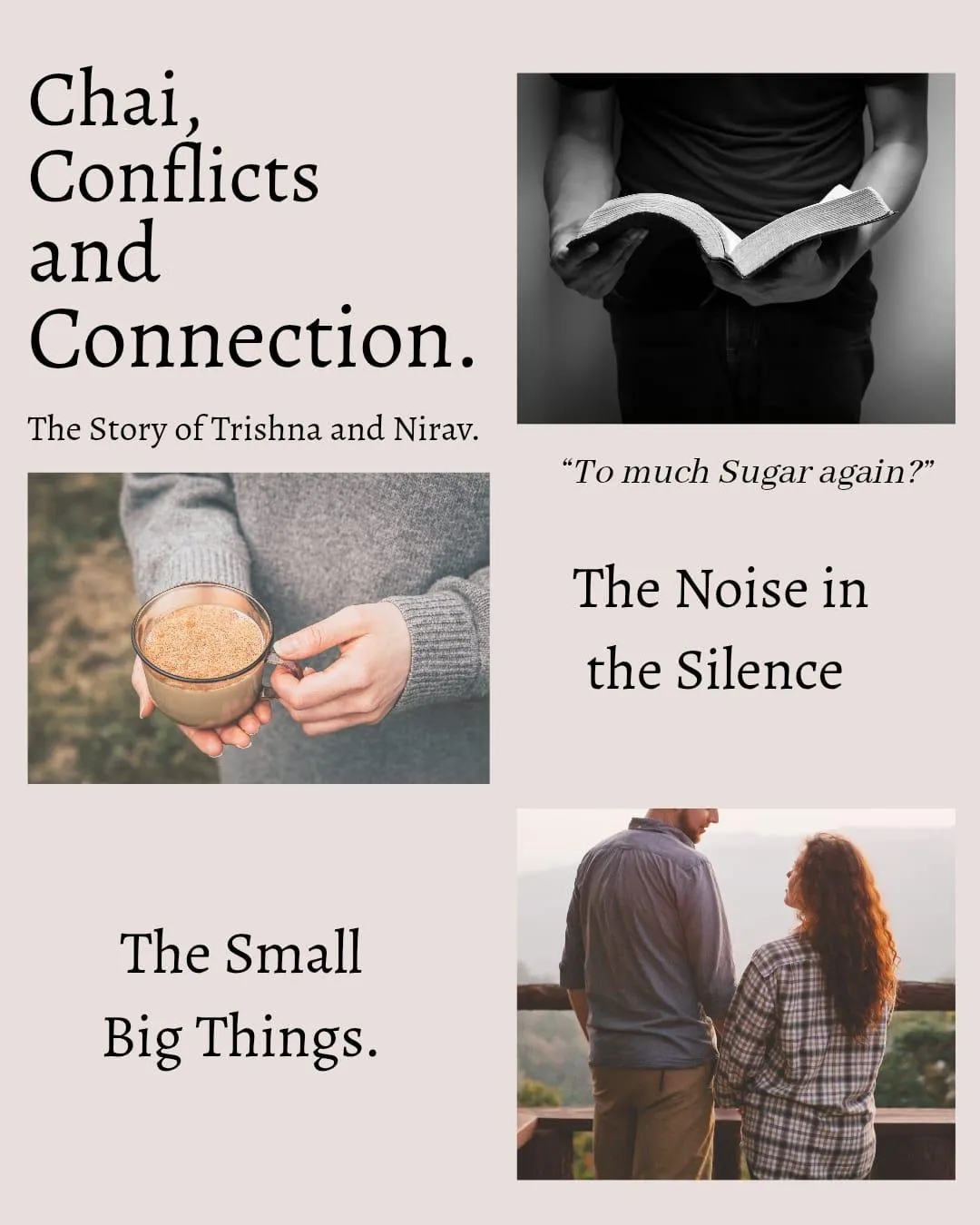
Chai, Conflicts, and Connection: The Story of Trishna & Nirav
Every morning, Trishna made tea.
And every morning, Nirav would say the same thing.
“Too much sugar again?”
Trishna would smirk. “Maybe you’re just too bitter to appreciate sweetness.”
It was their little joke. Light-hearted. Familiar. Safe.
Until it wasn’t.
One day, the laughter didn’t come. The joke sat between them like a wall. The spoon’s clink in the cup was louder than their words. Silence crept in, uninvited but persistent. And slowly, joy—the feeling, not just the word—left the room.
They weren’t fighting about tea.
They were fighting because they had stopped listening.
The Noise in the Silence
Nirav worked late nights, eyes glued to his screen even at the dinner table. Deadlines were many, energy was low, and he barely noticed the tiredness in Trishna’s voice.
Trishna, on the other hand, had started reading articles about “emotional disconnection in marriage.”
She didn’t want to nag. So she stopped talking.
She spoke more to her diary than to her husband.
She missed being seen.
She missed being understood.
Until one evening, while making tea, she finally said it.
The Question That Changed Everything
Trishna stood at the counter, her fingers wrapped around a chipped mug. She didn’t look up when she asked:
“Is it normal to feel lonely in a relationship even when we live together?”
Nirav paused mid-scroll. For the first time in weeks, he really looked at her.
She wasn’t blaming him. She wasn’t angry.
She was hurting.
“I don’t know,” he whispered. “But I feel it too.”
It wasn’t the kind of conversation that ends with one talk and everything is fixed.
But it was a beginning.
Why Do We Feel Lonely in Relationships?
Later that week, Trishna and Nirav sat across from me during a couple’s therapy session. Trishna’s question—“Is it normal to feel lonely in a relationship?”—is one I hear often.
The short answer is: yes. It’s more common than we think.
Being physically close doesn’t guarantee emotional closeness. You can share the same bed and still feel like you’re on different islands.
According to Dr. John Gottman, a renowned relationship researcher, couples stay emotionally connected when they regularly respond to each other’s “bids for connection.” These bids are the small moments—sharing a meme, asking for a hug, making tea—that invite your partner to engage.
When we miss these bids—or worse, ignore them—emotional disconnection begins.
Trishna and Nirav weren’t broken.
They were just unattuned. Stuck in routines. Speaking different emotional languages.
The Turning Point
In therapy, we uncovered something simple but powerful: their love languages.
Trishna felt most connected through words of affirmation—a “thank you,” a compliment, an “I see you.”
Nirav expressed love through acts of service—doing chores, fixing the leaky faucet, picking up groceries.
The problem? They were loving each other in their own language—not the other’s.
So when Nirav said, “I did the laundry,” Trishna heard: “Cool. But you haven’t said anything kind to me in days.”
And when Trishna left heartfelt notes, Nirav thought: “That’s nice, but I wish she’d help with dinner.”
With this insight, they started small.
A walk after dinner—with no phones.
A sticky note on the mirror from Nirav: “You work so hard. Thank you.”
A cup of tea from Trishna, made just right.
They even kept coming to therapy—not because they were broken, but because they wanted to grow.
Actionable Steps for You
Feeling distant in your relationship? Try these small but powerful practices:
1. Emotional Check-Ins
Ask: “How are you feeling emotionally today?”
Don’t settle for “fine.” Be curious. Listen.
2. Respond to Emotional Bids
Did your partner just show you a reel, ask you to join them for a walk, or offer tea? That’s a bid for connection.
Respond with presence.
3. Learn Each Other’s Love Languages
There are five:
Words of Affirmation
Acts of Service
Quality Time
Physical Touch
Receiving Gifts
Discover yours—and your partner’s. Love them in their language.
4. Practice Screen-Free Time
Set 30 minutes daily with no screens. Reconnect. Talk. Share silence.
5. Start Therapy Before There’s a Crisis
Therapy isn’t for the broken. It’s for the brave. And it works.
The New Morning Routine
A few sessions later, Trishna and Nirav walked into my office with a lighter energy between them. The tension had eased, and their smiles were no longer forced. As we settled in, Trishna chuckled softly.
“You’ll like this,” she said. “The other morning, I handed Nirav his chai…”
She glanced at him, and he picked up the story.
“I took a sip and said, ‘Perfect.’ She asked, ‘Too sweet?’—and And I told her—"yeah, maybe still a bit sweet—but it tasted like effort. And I see it now".
They both chuckled. Not the awkward kind, but the kind that says, we’re trying. Not just because of the tea, but because they understood what it symbolized.
It wasn’t about sweetness or perfection anymore. It was about showing up. It was about the intention behind the small things—the quiet gestures that say, I see you. I’m trying.
Their relationship wasn’t flawless. But it was growing.
And that morning cup of chai?
It became a symbol—not of routine, but of renewed connection.
In Conclusion: Love Is Like Tea
Love is not a grand gesture.
It’s not always passion or poetry.
It’s a quiet commitment to check in. To try again. To see and be seen.
Sometimes, it’s a cup of chai with just the right amount of sugar.
Sometimes, it’s the courage to ask, “When did we stop being us?”
If you’re in a relationship that feels distant, know this
You’re not alone.
And there’s a way back.
You just have to take the first step maybe with a question, maybe with a cup of tea, maybe with a visit to someone who can help.
Because healthy relationships aren’t built on perfection.
They’re built on effort.
One sip, one word, one small act of love at a time.
